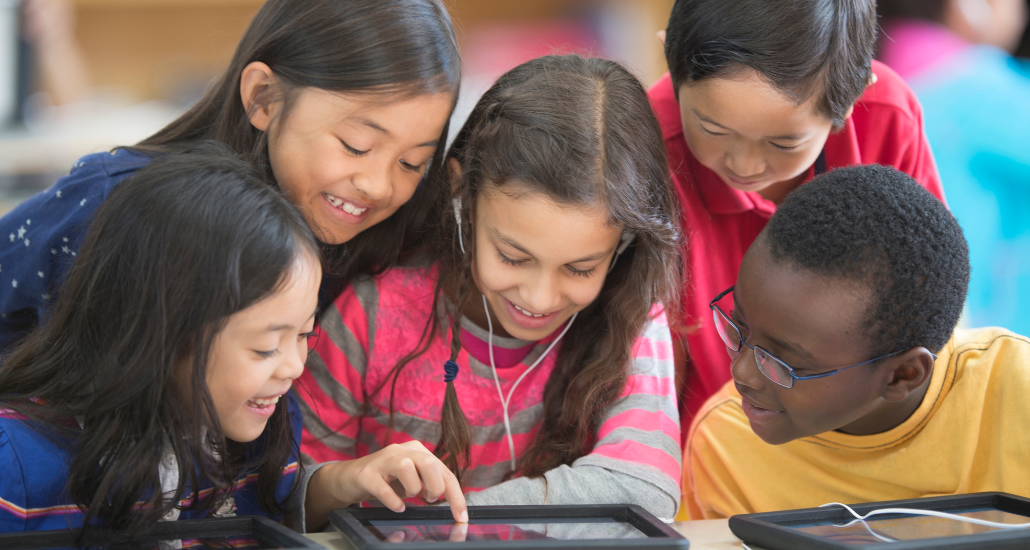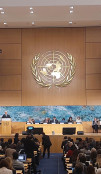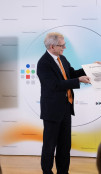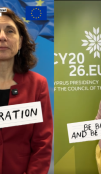Realising the Right to Education Worldwide Through Digital Transformation

Whereas the pandemic has accelerated the digital transformation of education, allowing millions of children and youth to keep accessing education during lockdowns, it has also exacerbated the global digital divides. Research by UNICEF and ITU has shown that in high-income countries, 87 per cent of children and young people have an internet connection at home, whereas in low-income countries only 6 per cent do so. The digital divide in education also had a disproportionate impact on those in the most disadvantaged situations and negatively affected gender equality. With far less access to the internet and to mobile technology than boys, girls have been disadvantaged in accessing remote learning.
On 3 October 2022, the African Union and the European Union thus took a stance for a digital transformation governed by human rights at a joint side event. The event was moderated by Peggy Hicks, Director of the Thematic Engagement, Special Procedures and Right to Development Division of the UN Human Rights Office (OHCHR), and focused on the realisation of the right to education, ensuring access to quality and inclusive education worldwide, in particular analysing opportunities, challenges, and the role of regional organisations, to address the exclusion of women and girls and / or persons with special needs through using educational technologies and strengthening digital competencies. Both the EU and the AU reiterated their commitment to protect and promote the right to education and to work together in this regard.
“The AU is committed to the promotion and protection of all Human Rights, particularly the right to education which is in great need for the African continent.” Ambassador Bankole Adeoye, Commissioner for Political Affairs, Peace and Security of the African Union.
The AU has adopted a rights-based approach to its development agenda as well as it has put core place to the Right to Development. Ambassador Bankole Adeoye further stressed how “the right to education worldwide through digitalization is critical especially for a continent with a very young population trying to build from the bottom up.” The AU puts importance on the right to education as a critical element of the 2030 Agenda as well as Agenda 2063, believing that access to information on the internet provides opportunities for affordable and inclusive education globally, and especially to the African continent.
In February 2022, EU-AU Summit leaders agreed that education is key for a sustainable future for both continents. The EU and AU committed to invest in inclusive and equitable quality education by improving legal and policy frameworks, access, and teachers’ training, and to contribute to safe delivery of education services as well as to ensure that learning gaps resulting from the pandemic are addressed.
“The EU has chosen to put education at the heart of the post-pandemic recovery and almost doubled its global spending for education to over 6 billion for the period 2021-2027. The EU will dedicate at least 10% of its international partnerships budget with Africa, Latin America, the Caribbean, Asia and the Pacific, and 10% of its humanitarian aid budget to education.“
Eamon Gilmore, Special Representative for Human Rights of the European Union
During the event speakers acknowledged that while the digital transformation of education provides a wide range of opportunities, it also hides some risks and challenges. Farida Shaheed, UN Special Rapporteur on the Right to Education, reminded that digital technologies will not solve all education problems and that technology, in the end, remains only a tool, so unless policies promote the right to education for all, it is more likely to enhance disadvantages. Alex Wong, Chief, Special Initiatives, International Telecommunication Union (ITU) and Co-Lead, Giga, emphasised the importance of the three ‘C’s: content, capacity, and connectivity. Geert Cappelaere, UNICEF Representative European Union Institutions, Director UNICEF Partnership Office, added the three ‘A’s: availability, accessibility, and affordability, as crucial requirements so that the right to education does not only remain a far dream for hundreds of millions of children, as it is still the situation now, unfortunately.
Likewise, Salima Namusobya, Executive Director of the Initiative for Social and Economic Rights, Kampala, noted limited to no access to technology infrastructures due to costs or due to lack of availability, so, according to her, states need to focus on acknowledging that equitable education will come at high cost and countries need to invest to not leave anyone behind. Magdalena Sepúlveda Carmona, Executive Director of The Global Initiative for Economic, Social and Cultural Rights, Geneva, recalled the Abidjan principles for education and called for their implementation as well as she elaborated on the issues of data protection and privacy.
We know that free, equitable, inclusive quality education is key to realise every Sustainable Development Goal (SDG). Yet, we have a long way to go to achieve goal 4 by 2030. We all must step up efforts, and do more and better. This includes regional organisations such as the European Union and the African Union. In the face of a global education crisis that is deepening at a worrying speed, driven by the COVID-19 pandemic and the global crises in food, energy, and finance due to the Russian aggression against Ukraine, the EU and its Member States will live up to our commitment to contribute to the realisation of the right to education for all, everywhere. We will do this in close collaboration with our partner countries, the international community, regional organisations, and education stakeholders at all, including local levels.





